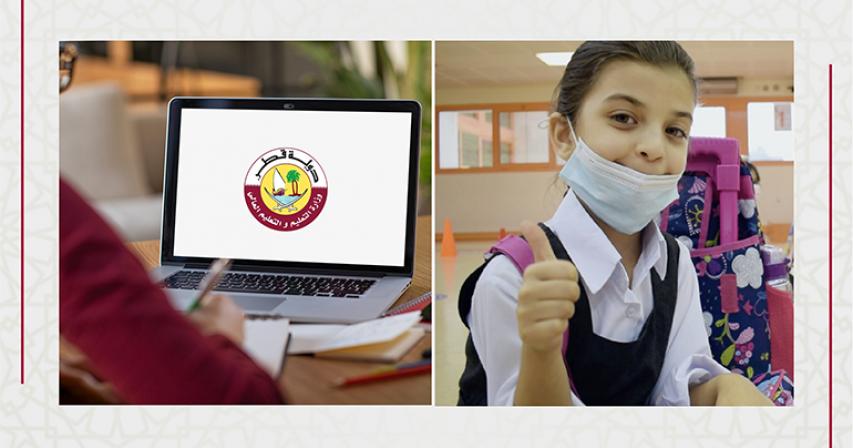The Ministry of Education and Higher Education (MoEHE) has decided to adopt the actual rotating attendance system for students in government and private schools as well as kindergartens.
The ministry has decided to cancel the decision to choose between actual attendance and distance learning. The new system will be implemented after the end of the mid-term exams of the first semester, as of November 1.
The decision was made after taking into account the public health indicators related to COVID-19 and the continuous monitoring and evaluation of the educational process in light of the pandemic within the framework of the general situation data.
The ministry also decided to raise the average attendance rate in all government and private schools and kindergartens to 42 percent of the capacity of schools, in accordance with the weekly rotating attendance schedule.
It said the compulsory attendance will start from November 1 for public and private schools according to their academic calendar after the end of the mid-term exams of the first semester, which will start from October 25 and no later than November 1, provided that the blended education system will be applied according to the weekly rotating attendance schedules.
All government and private schools are obligated to divide the total number of students into classes with a maximum of 15 students per class, with adherence to a distance of 1.5 metres between each student, and wearing of masks.
The school will organise the entry and exit of students from and to the school building to prevent crowding and maintain social distancing. Students with chronic diseases are excluded from attendance to the school building during the first semester, provided they have obtained medical certificates.
The ministry emphasised the need for all administrators and teachers to adhere to the precautionary measures and fully cooperate with the authorities concerned in the event of discovery or suspicion of any case of COVID-19 infection, and to deal firmly with any violations of precautionary measures in the schools. The violations of these obligations will entail legal action.
It is also permissible, with the prior approval of the Private Schools Affairs Department of the Ministry of Education and Higher Education, to apply the two-shift system in private schools and kindergartens on a daily basis to cover the schooling hours in the school or kindergarten through the attendance of students in two shifts, provided that the attendance rate does not exceed 42 percent in one shift, whether in classrooms or in the school as a whole, with the emphasis on thoroughly disinfecting surfaces between the two periods.
Specialised and technical schools, schools for people with special needs, and village schools are committed to the same attendance rates mentioned. In the schools that include a small number of students equal to the approved percentages, attendance for all students shall be 100 percent five days a week, provided that the number of students in one class does not exceed 15 students. They are required to maintain a distance of 1.5 metres between students.
The schools will provide students with the rotating schedules that clarify the days of attendance to the school building and the days in which they will receive distance learning, according to each school stage.
The ministry affirmed that these amendments serve the interest of students and work on their gradual return to the school environment given it benefits on the academic achievement and the psychological and social aspects of the students.
The ministry underlined that the health and safety of its students, teaching staff, administration and all school personnel is an utmost priority, and that it takes, in cooperation with authorities concerned headed by the Ministry of Public Health, all measures and procedures to protect the students and ensure their safety, as their physical and psychological health represents the highest priority within the framework of the educational process.
According to the data, the general situation regarding the coronavirus in schools is very reassuring.
What is rotational education?
Moza Al Madhahka, Director of Educational Guidance Department at the Ministry of Education and Higher Education, has said rotational education is the one in which a group of students attends the school in the first week and the other in the second week on a rotation basis, and the distance learning continues as well.
“The time limit for implementing the rotational education system is dependent on instructions from the Ministry of Public Health. We hope that students will return to their schools in natural course as soon as possible. We affirm that student safety is a top priority for the Ministry of Education and Higher Education,” Al Madhahka said.
Reducing educational loss as much as possible is one of the reasons that prompted the ministry to decide on rotating education. The parents’ strong feeling that students need to attend the school is another reason.

Comments